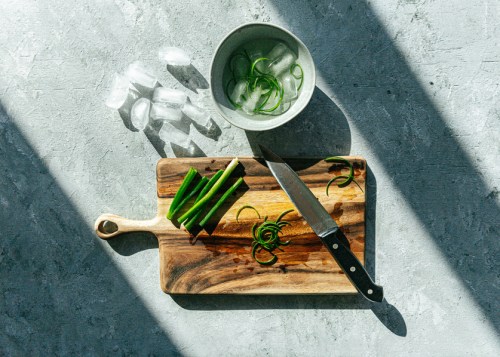New day, new social wellness media trend circulating around the internet. This time we’re talking about the onion water trend on TikTok, where folks are seen sipping on onion-infused beverages in the name of health.
Experts in This Article
registered dietitian and nutrition educator with Fresh Communications
Mayo Clinic-trained registered dietitian
From speeding recovery from respiratory syncytial virus (RSV), sinus infections, colds, and coughs to helping improve asthma, gut health, and blood pressure, there are many health claims associated with this humble liquid. But are they fact or fiction? Let’s see what the hard evidence tells us about this trend and hear what some health experts have to say before we ditch the wedge of lemon for a slice of onion.
Why drinking onion water is one trend to skip
Missed this “cultural moment?” You’re in the clear—but here’s the backstory on the onion water trend.
Basically, onions started making their way into many-a-TikTok a couple of years ago and never went away. Folks have tried using onions to clean their grills grates and purify their air (smells… fishy)—but more recently, social media is splashed with videos describing onion water as a natural immune booster.
We spoke with two dietitians from different backgrounds on their thoughts regarding this trend—and to save you some time (and tears), go ahead and ignore the onion water offer (if it ever comes). That said, if you really love the flavor of onions, read on. Onion water still has plenty of potent health perks—if you’re into that sort of thing!
When asked about first impressions of onion water, Bianca Tamburello, RDN at FRESH Communications, says: “My initial thought was that an onion water concoction is probably not pleasant to the taste buds.” Uh, same.
Brianna Wieser, RDN, LDN, a Mayo Clinic-trained dietitian and Lifestyle Medicine Subject Matter Expert at MOBE, echoes this. “To be honest, the thought of drinking onion water sounds pretty off-putting,” she says. “That being said, the health benefits of onions are well-established in scientific literature, and cultures have used onions for centuries for various therapeutic purposes.”
To save you some time (and tears), go ahead and ignore the onion water offer—if it ever comes. That said, if you really love the flavor of onions, read on. Onion water still has plenty of potent health perks—if you’re into that sort of thing.
Quick recap: Onion health benefits
Interestingly, the onion is one of the most ancient food sources known to historians, with their culinary and medicinal use being traced back to over 5,000 years ago. This member of the allium family has been used as a flavor booster and addition to a healthy diet ever since, and for good reason.
While the green vegetables tend to get all the attention, white vegetables, like onions, have their own unique nutritional benefits. Onions are packed with nutrients like vitamins, minerals, antioxidants, and other plant compounds.
1. Onions can help bolster your immune system
For starters, onions contain a considerable amount of vitamin C to help boost immunity. “They offer up vitamin C, a nutrient well known to support a healthy immune system which is important when fighting off a virus or infection,” Tamburello says. One large onion contains about 11 milligrams of vitamin C.
2. Onions help maintain hydration
In addition to vitamin C, onions are also high in potassium, a mineral and electrolyte that helps to balance fluid in the body, maintain muscle health, and regulate heart rhythms. One large onion has about 219 milligrams of potassium. Keep in mind that the American Heart Association (AHA) recommends that adults between the ages of 19 and 50 consume about 3,400 milligrams (men) and 2,600 milligrams (women) of potassium per day.
3. They’re rich in vitamin B
Onions provide impressive amounts of B vitamins folate and B6, both of which are important for cell growth, energy levels, and optimal metabolism. In fact, a vitamin B deficiency might be one reason why you feel, well, blah.
4. Onions are packed with antioxidants
One of the most unique nutritional aspects about onions is that they are full of organic plant compounds including antioxidants and flavonoids like quercetin, kaempferol, and organosulfur compounds. In fact, researchers have found that onions contain 25 different flavonoids1, making them one of the highest sources in the diet.
What’s more, these plant compounds are super effective in fighting harmful bacteria, reducing inflammation, and eradicating free radicals in the body—bolstering onion’s immune-supporting superpowers.
5. They can help support heart and brain health
Quercetin, one of the flavonoids found in onions, is also a potent antihypertensive, meaning that it can help reduce and regulate blood pressure in those with hypertension or chronically high blood pressure. It has also been shown to protect the brain to help prevent Alzheimer’s2 and other neurodegenerative disorders.
6. Onions help fight inflammation
The nutrition onions possess translates to improved health outcomes from many different angles. The plant compounds in onions that fight free radicals in the body don’t discriminate, and will actually inhibit osteoclasts (the cells that break down bone tissue) in an extremely beneficial way.
One study found that in a study group of women over the age of 50, those who ate onions everyday had five percent greater bone density3 than those who ate them once a month or less and frequent onion consumption could reduce risk of hip fracture by up to 20 percent.
7. Onions contains prebiotic properties for gut health
They can even help your gut health (seriously, what can’t they do?). As Wieser explains, “Onions contain prebiotic properties which support a diverse gut microbiome, known to [positively] impact nearly every system of our body.” These prebiotic properties come from the soluble fiber that onions contain, also aiding in healthy digestion.
Additions research on onions:
- Studies have also shown that eating onions can help reduce blood pressure4 and cholesterol5.
- The organosulfur compounds in onions have even been shown to have cancer-reducing properties6.
- Intake of alliums, including onions, have also been found to reduce the risk of colorectal cancer7, ovarian cancer8, and gastric cancer9.
- Animal studies have also shown onions to have protective effects against respiratory and allergic disorders10.
Should you start drinking onion water?
So, do all these health benefits mean that you should halt whatever you’re doing and whip up some onion water immediately? Still: Hard pass for me, but you do you!
“Despite the health benefits of the onion, our body’s ability to heal and recover from illness has far more to do with our daily lifestyle habits like overall nutrition, physical activity, sleep, and stress management than drinking a glass of onion water when we are feeling sick,” Wieser says.
That said, one quick nutrition lesson about infused waters. When it comes to nutrients and plant compounds, know that some are water soluble while others are fat soluble. This means that these nutrients dissolve into either a water-based or fat-based solution to eventually be absorbed by the body. So for example, if you ate a salad full of healthy fat-soluble vitamins with a fat-free salad dressing and no other source of fat, your body would be missing out on those powerful nutrients.
When it comes to onions, all flavonoids are water soluble, as are B vitamins, vitamin C, and all minerals including potassium. This means that onion water is at the very least on track in that regard, so when onions are in water, they will leach these nutrients into the water to create a nutrient-rich beverage that may have a positive impact on your health.
Any side effects of onion water—other than the bad breath?
When looking at the trend from a safety perspective, Tamburello shares, “drinking onion water poses little to no risk for those who are curious to test it out, however, it’s important to see a doctor when you’re not feeling well to ensure your health needs are fully addressed with research-based treatment.” That’s to say, it’s not a type of food that’ll make a cold worse.
So while onion water certainly won’t hurt your health, there isn’t “any research that supports the effectiveness of onion water in speeding recovery from RSV, sinus infections, or colds,” Tamburello says. It’s also important to note that TikTok has been a hub for health misinformation in the past, so as with every health claim you see on social media, be sure to do your research.
Saying a tearful goodbye to the onion water trend
It’s vital to look at the whole picture before you start downing cups of onion water when figuring out what to eat when sick. “Despite the health benefits of the onion, our body’s ability to heal and recover from illness has far more to do with our daily lifestyle habits like overall nutrition, physical activity, sleep, and stress management than drinking a glass of onion water when we are feeling sick,” Wieser says.
So, when down bad with a cold, a cup of onion water won’t hurt. But pairing that with other immune-boosting recipes like a tasty chicken soup when sick will give you the best fighting chance to get over a cold quickly. Plus, staying on top of your immunity on the day-to-day can also help prevent future illness. One of our favorite ways to do so? Add in immune-boosting smoothie ingredients into our daily morning routines.
Slimestad, Rune et al. “Onions: a source of unique dietary flavonoids.” Journal of agricultural and food chemistry vol. 55,25 (2007): 10067-80. doi:10.1021/jf0712503
↩︎Khan, Haroon et al. “Neuroprotective Effects of Quercetin in Alzheimer’s Disease.” Biomolecules vol. 10,1 59. 30 Dec. 2019, doi:10.3390/biom10010059
↩︎Matheson, Eric M et al. “The association between onion consumption and bone density in perimenopausal and postmenopausal non-Hispanic white women 50 years and older.” Menopause (New York, N.Y.) vol. 16,4 (2009): 756-9. doi:10.1097/gme.0b013e31819581a5
↩︎Brüll, Verena et al. “Effects of a quercetin-rich onion skin extract on 24 h ambulatory blood pressure and endothelial function in overweight-to-obese patients with (pre-)hypertension: a randomised double-blinded placebo-controlled cross-over trial.” The British journal of nutrition vol. 114,8 (2015): 1263-77. doi:10.1017/S0007114515002950
↩︎Ebrahimi-Mamaghani, Mehranghiz et al. “Effects of raw red onion consumption on metabolic features in overweight or obese women with polycystic ovary syndrome: a randomized controlled clinical trial.” The journal of obstetrics and gynaecology research vol. 40,4 (2014): 1067-76. doi:10.1111/jog.12311
↩︎Galavi, Amin et al. “The effects of Allium cepa L. (onion) and its active constituents on metabolic syndrome: A review.” Iranian journal of basic medical sciences vol. 24,1 (2021): 3-16. doi:10.22038/ijbms.2020.46956.10843
↩︎Putta, Swathi et al. “Preventive and Therapeutic Potentials of Anthocyanins in Diabetes and Associated Complications.” Current medicinal chemistry vol. 25,39 (2018): 5347-5371. doi:10.2174/0929867325666171206101945
↩︎Nicastro, Holly L et al. “Garlic and onions: their cancer prevention properties.” Cancer prevention research (Philadelphia, Pa.) vol. 8,3 (2015): 181-9. doi:10.1158/1940-6207.CAPR-14-0172
↩︎Turati, Federica et al. “Colorectal cancer and adenomatous polyps in relation to allium vegetables intake: a meta-analysis of observational studies.” Molecular nutrition & food research vol. 58,9 (2014): 1907-14. doi:10.1002/mnfr.201400169
↩︎Tsuboki, Junko et al. “Onionin A inhibits ovarian cancer progression by suppressing cancer cell proliferation and the protumour function of macrophages.” Scientific reports vol. 6 29588. 12 Jul. 2016, doi:10.1038/srep29588
↩︎Turati, Federica et al. “Allium vegetable intake and gastric cancer: a case-control study and meta-analysis.” Molecular nutrition & food research vol. 59,1 (2015): 171-9. doi:10.1002/mnfr.201400496
↩︎Beigoli, Sima et al. “Effects of Allium cepa and Its Constituents on Respiratory and Allergic Disorders: A Comprehensive Review of Experimental and Clinical Evidence.” Evidence-based complementary and alternative medicine : eCAM vol. 2021 5554259. 11 Sep. 2021, doi:10.1155/2021/5554259
↩︎
Sign Up for Our Daily Newsletter
Get all the latest in wellness, trends, food, fitness, beauty, and more delivered right to your inbox.
Got it, you've been added to our email list.









